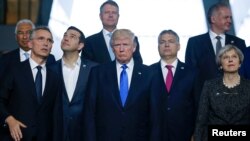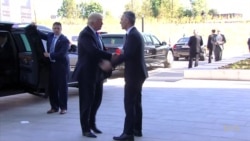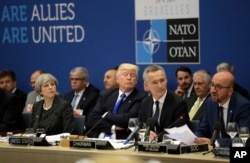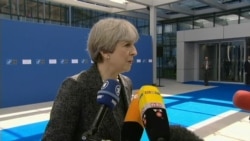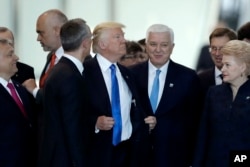U.S. President Donald Trump publicly lectured his fellow NATO leaders Thursday for not paying their fair share for defense, and he urged them to be more focused on terrorism.
"The NATO of the future must include a great focus on terrorism and immigration, as well as threats from Russia and on NATO's eastern and southern border," he told NATO leaders at alliance headquarters in Brussels.
Trump was speaking at a ceremony to unveil a memorial symbolizing the commitment of NATO members to the principle of collective defense, as outlined in Article Five of the alliance treaty. The memorial is a twisted piece of metal from remains of the World Trade Center, a reminder that the only time Article Five was invoked was after the September 11, 2001 attacks on the United States.
WATCH: Trump's remarks on areas Alliance needs to focus on
A conspicuous omission from Trump's speech, however, was any clear affirmation of the U.S. commitment to Article Five. Trump's refusal to endorse that principle on the campaign trail raised fears in Europe about whether the United States is fully committed to its defense.
The president made only passing reference to Article Five, saying "we will never forsake the friends that stood by our side." But White House spokesman Sean Spicer clarified afterward that the United States will not waver on collective defense."We're not playing cutesy with this," Spicer said. "He's fully committed."
Trump was quite clear, however, in scolding alliance members on the defense spending issues. "I have been very, very direct with Secretary (Jens) Stoltenberg and members of the alliance in saying that NATO members must finally contribute their fair share and meet their financial obligations," Trump said.
The president noted that 23 of 28 member nations are not paying what they should, something that is "not fair'' to the people of the United States.
'Positive reaction'
Spicer told reporters afterward that the other leaders responded positively to Trump's call for them to work toward meeting NATO spending goals. "It was a very positive reaction and affirmation of the president's priorities today," Spicer said.
In his speech, Trump also said this week's Manchester bombing "demonstrates the depths of the evil we face with terrorism."
British Prime Minister Theresa May's spokesman told reporters the prime minister used the occasion to express her concern to Trump about leaks in the U.S. media revealing details of the Manchester bombing investigation.
WATCH: Mays on intelligence leaks by U.S.
Manchester police were reported to have been furious that the New York Times published unreleased forensic photographs from the crime scene, and U.S. media outlets announced the name of the suicide bomber before it was released by British officials.
Media reports said British police stopped sharing information with their American counterparts after the leaks. Mark Rowley, head of Britain's counterterrorism unit, said late Thursday that the two countries had shared resumption of intelligence-sharing.
Terrorism fight to top talks
Before meetings this week with NATO leaders, Trump called terrorism the "number one" problem facing the world.
In a meeting Wednesday with Belgian Prime Minister Charles Michel in Brussels, Trump pointed to the Manchester attack as an example of the pressing terror threat.
"When you see something like that happened a few days ago, you realize how important it is to win this fight, and we will win this fight," Trump said.
"We have to be able to increase defense spending when tensions are going up. And tensions are going up," NATO Secretary General Jens Stoltenberg told reporters Thursday.
A senior U.S. official told reporters Stoltenberg expressed surprise in his meeting with Trump that anyone would question Washington's commitment to the NATO collective defense principle.
"Stoltenberg seemed bemused that it would ever be asked," the official said. "He [Stoltenberg] said deeds are what show the [U.S.] commitment to Article Five, and he came to the Article Five ceremony."
After Brussels, the U.S. president returned to the Italian island of Sicily for a summit of the Group of Seven major industrialized Western powers.




